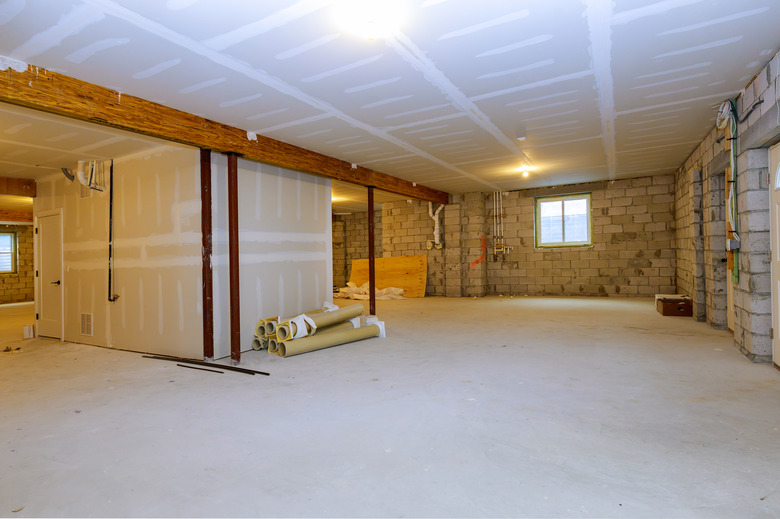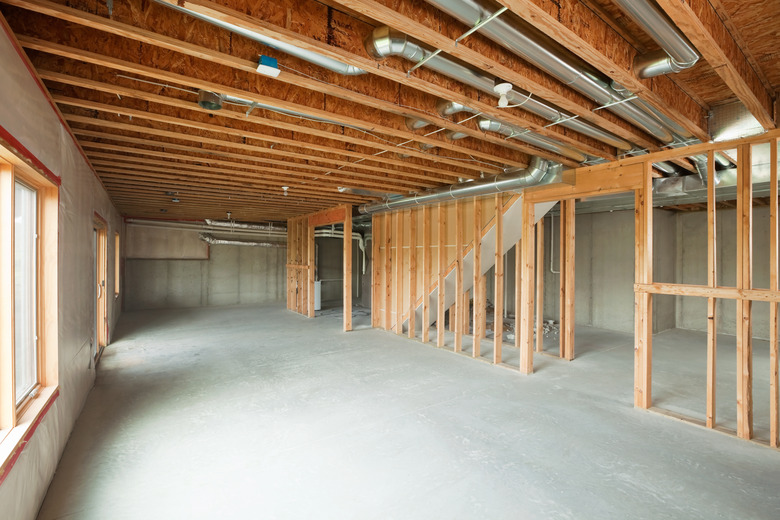What To Know Before You Hire A Basement Pro
Let's face it: Basements are often damp, cold, and musty — but in the right hands, you can eventually use this space for entertaining, lounging, and even an extra bedroom. But converting a dreary unfinished basement into a comfortable living space doesn't sound like the sort of DIY project you can handle, which means you need a pro who specializes in basement refinishing can deliver.
Not all contractors are qualified for this type of work. It requires an approach that differs from what goes on upstairs and a knowledgeable basement contractor who knows the difference can spare you the disastrous results of floors and walls being installed incorrectly or support beams being altered without the guidance of a structural engineer. Basement work is a different animal, and the pro you hire needs to be just that — an experienced basement pro. The last thing you want is an unqualified newbie heading downstairs to work things over.
Ready to remodel the cave-like room you currently have into more usable living space? Here's everything you need to know about hiring basement pros.
What Do Basement Pros Do?
What Do Basement Pros Do?
In the world of home improvement, basement finishing and remodeling pros are the contractors you call when you want your project to be successful. They understand the difference between upstairs projects and basement projects — how they differ and why. They're basically specialists whose business is dedicated to this type of work. Unlike an inexperienced contractor, a reputable basement pro will offer the following:
- Knowledge about special approaches and materials that basement jobs require.
- An ability to offer valuable expertise and advice pertaining to design, helping you choose solutions for unique problems and steering you clear of trends that may not work in your space or that may simply be a waste of space that could otherwise be used more practically. Unless you have basement design experience, it's best to avoid contractors who seem uninterested in helping you make design choices.
- Familiarity with and willingness to conform to local building code.
- Willingness to pull the proper permits before the work starts.
First, Address Basement Waterproofing
First, Address Basement Waterproofing
As soon as you start thinking about improving your basement, you need to turn an eye toward the most important step in preparing the lower level of your house for the job: taking care of moisture problems that are bound to exist to at least some extent. If you don't, you're asking for trouble, and it's likely that a reputable basement pro wouldn't proceed with the project anyway if water issues were detected.
The obvious reasons for correcting basement water problems before starting any finishing or remodeling work have to do with preserving the structure of your foundation, warding off mold issues, tamping down condensation and humidity problems, and keeping water away from newly installed materials.
Causes of water issues include problems such as poor drainage systems outside your home, ineffective gutter systems, ground-slope issues, and cracks in the foundation and basement floor. Solutions can involve using coatings and sealants inside and adding or altering drainage systems and applying waterproofing barriers on the outside to keep water out in the first place.
Another important reason to get serious about this before you begin your project is that the fixes for water issues can in some cases be very expensive. Exterior work can involve excavation with heavy equipment and tools. The funds you've set aside for the actual basement makeover can be seriously depleted when you have to cough up several thousand dollars for foundation work. So, looking into moisture issues before establishing a budget for the main project makes sense. You may even find yourself postponing the rest of the work if your foundation work is extensive.
When looking for a waterproofing contractor, check for licensing and research online ratings. Make every effort to get answers to the following:
- How long have you been in business?
- Can you provide references from past customers?
- Do you offer a warranty? If so, what does it cover?
- What type of solution do you think I need and why?
Do Your Homework
Do Your Homework
Before beginning your search for a basement pro, do some exploring online, learning as much as you can about basement finishing and remodeling so you can be armed with information and a greater understanding of the process when you talk to potential contractors. Read about different types of materials used in basement finishing and remodeling, different issues that need addressing, and all about the process. Look at photos that can help generate ideas for your space and save them to show to the contractor later when sharing ideas.
Also take time to find as much information as possible about potential contractors you plan to contact. Check to see whether the contractor has a website and look up customer reviews. In some states, you can also check a government licensing agency website to learn in advance whether the contractor is listed as licensed.
Basement Pro vs. General Contractor
Basement Pro vs. General Contractor
Working with a general contractor who was employed and trained in the past by a basement specialist business will put you closer to a good outcome than working with a general contractor who has no basement experience at all. However, when it's time to approach your lower level, your best bet is to check out the finishers and remodelers in your area who specialize in basement work full time and whose quality of work may be more of what you're seeking.
All you have to do is stand in the middle of your basement and look around to see all the unique features a contractor has to deal with that aren't found in the rest of the house. Large furnace units, water heaters, HVAC ductwork, plumbing pipes, low ceilings, and support beams aren't exactly things you can clear out of the way for open-space basement remodeling. They can, however, create major design challenges with which general contractors may not work well. An experienced basement pro will smoothly incorporate these things into an overall design plan that's pleasing and will know the best ways to handle lighting design in an area with limited natural light.
Another difference between basement specialists and general contractors is their familiarity with appropriate techniques and materials for basement finishing and remodeling. Knowledgeable contractors allow proper ventilation for the furnace. They frame walls so that moisture barriers help prevent mold, and they prevent major structural damage by constructing floating walls that allow for the heaving of concrete floors.
Conversely, unlike a knowledgeable basement specialist who offers warrantied products that perform well in dampness-prone basement environments, an inexperienced contractor will likely be found using products that may be inappropriate for the basement environment. The wrong drywall used for basement ceilings and walls can result in mold issues and drooping ceilings. Carpeting unwisely laid on wood subfloors not only decreases head room by several inches in a space with low ceilings but eventually leads to the wood floor taking on moisture that then leads to buckling, rotting, foul odors, and mold issues. A basement pro, however, will use basement flooring materials that are insulated, inorganic, and long-lasting.
Independent general contractors may not be familiar with local building code rules for basements, and disreputable contractors often simply ignore them. A reputable remodeler will pull permits and do work that meets the pertinent code requirements, which help to ensure that the finished product is safe and long-lasting.
Questions to Ask Before Hiring a Basement Pro
Questions to Ask Before Hiring a Basement Pro
You'll do yourself a disservice — possibly inviting serious trouble — if you're shy about posing questions to prospective basement contractors. Some of the most important issues to address include:
- Do you specialize in basements? Companies that specialize will have more valuable experience
and more extensive knowledge to offer. - How long have you been in business?
This is especially important when talking to an independent
contractor who worked with basement specialists in the past. Make sure the
association lasted long enough for the contractor to actually claim meaningful
experience. Five years is a good rule of thumb. If possible, check with the
former employer to verify length of employment. - Are you licensed and insured?
Ask for the contractor's license number so you can check
with your state's licensing agency for verification. Unwillingness or hesitancy
on the part of the contractor to provide such information is indication that
you should move on to the next contractor on the list. This is most likely to
be a problem with independent contractors, not full-service basement finishing
or remodeling businesses. - Is it possible to view work you've done and to speak with past customers?
Again, hesitancy to accommodate this request is a red flag. - Will you provide drawings of the plan, a guaranteed price, and written warranties?
- What's your time frame for starting and finishing the work?
- Will you pull permits? For any basement contractor who tends to ignore permits, asking the question serves notice of your awareness and concern about this important detail.
- What types of products do you use? If the answer doesn't involve reference to specialty products intended specifically for basement finishing or remodeling projects, move on to the next business on your list.
If you're able to speak with past customers, ask whether they were happy with the results, whether it was finished on time, and whether they would hire the contractor again.
What Will Basement Finishing and Remodeling Cost?
What Will Basement Finishing and Remodeling Cost?
If your project doesn't involve an elaborate plan and you have strong experience with certain types of work, you can save by approaching it as a partial DIY project, saving more complicated things for a pro. The more involved your plan, however, the more important it will be to hire someone for the job who has design skills and a track record of completing projects successfully.
Figuring out what you want to do with your basement so you can establish a budget for the project involves lots of decision-making. What you spend for your basement improvement can vary greatly depending on many factors, such as whether you're simply finishing the space or remodeling it.
Basement finishing is cosmetic and involves going from a bare concrete look to fully finished floors, walls, and ceilings. According to HomeAdvisor, basement finishing projects can run from $3,000 to $35,000 with an average cost of $18,500.
Basement remodeling, on the other hand, reconfigures the space and changes the purpose it serves, sometimes by adding walls to create new rooms and installing features, like bars and home theater rooms. Typical basement remodeling costs range from $12,268 to $33,049 with an average of $21,431 and vary with the overall size of the basement and design choices made.
A small basement of 300 to 700 square feet can run as low as $9,000, while the lower cost for a large basement of 1,500 to 2,000 square feet can set you back $45,000. The cost can rise dramatically once you begin adding home gyms, saunas, media rooms, and wet bars. Cost per square foot changes from one room type to another when multiple rooms are created. A bathroom's square-foot cost, for example, will be approximately four times higher than the square-foot cost for a basement living room.


